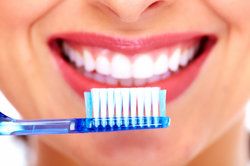Preventative Dentistry Tips
 With the advancement of restorative dentistry and technology, teeth can now be fixed or replaced, regardless of how bad the degree of decay. But no matter how impressive treatment becomes, the best way to protect teeth will always be to prevent damage from occurring in the first place. By taking care of your dental health at home and through regular professional appointments, you can greatly increase your chances of maintaining a strong, problem-free smile. Follow the below guidelines on effective preventative dentistry practices, as offered by Kansas City cosmetic dentist John Goodman.
With the advancement of restorative dentistry and technology, teeth can now be fixed or replaced, regardless of how bad the degree of decay. But no matter how impressive treatment becomes, the best way to protect teeth will always be to prevent damage from occurring in the first place. By taking care of your dental health at home and through regular professional appointments, you can greatly increase your chances of maintaining a strong, problem-free smile. Follow the below guidelines on effective preventative dentistry practices, as offered by Kansas City cosmetic dentist John Goodman.
Brushing and Flossing Habits
Proper brushing and flossing habits are arguably the most important part of one's dental health. In order to truly ward off bacterial build-up, patients must brush and floss consistently and thoroughly. Remember the following key points, and apply them to your hygienic routine:
- Brush twice a day, using fluoride toothpaste
- Hold the brush at about a 45-degree angle, brushing gently and in small circles
- Replace your toothbrush once the bristles become noticeably worn, usually once every three months
- Floss once a day after brushing
- Curve the floss around the edges of each tooth, including behind the back molars
- Consider using an ADA-approved mouthwash for the additional removal of bacteria and plaque
When brushing and flossing, pay attention to the health of your gums. If gum tissue appears inflamed or feels sensitive, it may very well be an indication of gingivitis. Bleeding gums are also a common symptom of early gum disease. Consult your doctor on what to do about gingivitis, either at home or through professional periodontal treatment.
Dietary Habits
Diet can play an important role in one's dental health, especially if patients have any lapses in hygiene. As most people know, sugar can be dangerous to teeth and gums. This is because bacteria in the mouth feed on simple carbohydrates, which encourages their growth and the secretion of acid that degrades tissue. Therefore, patients should avoid foods that are high in sugar and have little nutritional value, such as candy and most junk foods. Sugary drinks can be even worse, as they tend to have a high acid content as well.
Some foods, on the other hand, can be beneficial to teeth and gums. Crunchy vegetables such as celery and carrots can act as a natural toothbrush, while providing a healthy snack that is low in both sugar and acid. Other foods can actually bolster the health of teeth through calcium and phosphorus, including nuts, milk, cheese, fish, and lean meat.
Perhaps the best dietary habit of all, though, is the most simple: water. By drinking water with meals, you can neutralize acids, wash food particles off of teeth, and discourage plaque from accumulating.
Regular Professional Exams
As effective as good hygiene and eating habits are, there is no substitute for regular dental check-ups. When even a little bit of plaque escapes the reach of a toothbrush, it hardens into tartar, which in turn facilitates tooth decay and gum disease. Be sure to schedule routine cleanings in order to remove any remnants of tartar and to combat the early onset of disease.
In addition to a professional cleaning, patients gain the preventative advantages of a dental exam when they visit our office. Through an exam, the dentist can:
- Identify gum disease and recommend periodontal treatment
- Detect the beginnings of tooth decay
- Asses the overall health and alignment of teeth
- Help diagnose bruxism or similar harmful conditions
- Screen for oral cancer
For extra preventative measures, your dentist may offer fluoride treatment to strengthen teeth or dental sealants to protect molars from decay. Visit your dentist for a more comprehensive understanding of the general, preventative, and restorative services offered.
Schedule Your Next Appointment
Don't wait too long to schedule your next professional cleaning and exam. Call or email our office to set up your appointment or to inquire about one of our treatment options.


